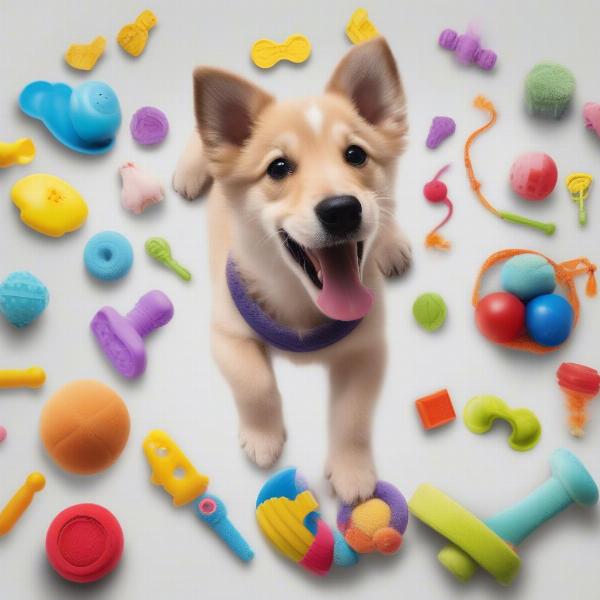The search term “puppy dog butt plug” raises immediate concerns for responsible dog owners and veterinarians alike. While curiosity might lead some to search for this term, it’s crucial to understand that inserting anything into a dog’s rectum can be incredibly dangerous and harmful. This article will address the dangers associated with this practice and offer safe, healthy alternatives for addressing any underlying issues that might lead someone to consider such an action.
While we understand the varied reasons someone might search for “puppy dog butt plug,” it’s essential to prioritize your dog’s health and well-being above all else. Foreign objects in the rectum can cause severe damage, including tears, infections, and blockages. These injuries can lead to significant pain, expensive veterinary bills, and even death in extreme cases. Never insert anything into your dog’s rectum without explicit direction from a qualified veterinarian.
Why is the Search Term “Puppy Dog Butt Plug” Concerning?
The use of any object inserted into a dog’s rectum for non-medical reasons is highly inappropriate and can signal underlying behavioral or medical issues in the dog. This practice can inflict pain, discomfort, and potentially life-threatening injuries on the animal.
Recognizing Underlying Issues in Your Puppy
Sometimes, seemingly strange behaviors can indicate underlying problems. If you’re concerned about your puppy’s behavior, consider these possibilities:
- Medical Conditions: Issues like constipation, diarrhea, or anal gland problems can cause discomfort and lead to behaviors like scooting or excessive licking.
- Behavioral Problems: Anxiety, stress, or boredom can manifest in unusual ways.
- Dietary Issues: Food allergies or sensitivities can also lead to digestive discomfort.
Safe and Healthy Alternatives for Addressing Your Puppy’s Needs
Instead of resorting to harmful practices, focus on providing your puppy with proper care and addressing any potential underlying issues.
- Veterinary Checkup: Schedule a visit with your veterinarian to rule out any medical conditions. They can diagnose and treat any underlying health problems, including anal gland issues, infections, or digestive disorders.
- Behavioral Training: Enrolling your puppy in obedience classes or working with a certified dog trainer can help address behavioral issues like anxiety, stress, and boredom.
- Enrichment and Play: Providing plenty of mental and physical stimulation through toys, puzzles, and regular exercise can prevent boredom and destructive behaviors.
- Proper Nutrition: A balanced diet formulated for puppies is crucial for their overall health and well-being. Consult your veterinarian for recommendations.
 Happy Puppy Playing with Toys: Enrichment and Play
Happy Puppy Playing with Toys: Enrichment and Play
Addressing Specific Concerns: Constipation and Anal Gland Issues
- Constipation: If your puppy is struggling with constipation, increasing their fiber intake with veterinarian-approved methods can help. Never administer human laxatives to your dog.
- Anal Glands: Anal glands can become impacted and uncomfortable for dogs. Your veterinarian can express these glands safely and provide advice on preventing future issues.
Conclusion
The search term “puppy dog butt plug” indicates a potentially dangerous situation for a puppy. Instead of engaging in harmful practices, prioritize your puppy’s health and well-being. Consult with your veterinarian to address any underlying medical or behavioral issues and provide your puppy with the love, care, and attention they deserve. By focusing on proper care, you can ensure your puppy lives a happy, healthy, and fulfilling life.
FAQ
- What should I do if I find my puppy licking or scooting excessively? Consult your veterinarian immediately to rule out any underlying medical issues.
- How often should I take my puppy to the vet? Puppies require more frequent vet visits than adult dogs, especially in their first year. Follow your veterinarian’s recommendations for a vaccination and checkup schedule.
- How can I prevent behavioral issues in my puppy? Early socialization, consistent training, and providing plenty of enrichment and play are crucial for preventing behavioral problems.
- What are signs of a healthy puppy? A healthy puppy typically has a good appetite, bright eyes, a shiny coat, and is playful and energetic.
- What should I feed my puppy? Feed your puppy a high-quality puppy food formulated specifically for their age and breed. Consult your veterinarian for recommendations.
- How can I tell if my puppy is constipated? Signs of constipation include straining to defecate, producing hard or dry stools, and decreased frequency of bowel movements.
- What should I do if I suspect my puppy has impacted anal glands? Do not attempt to express the glands yourself. Schedule an appointment with your veterinarian to have them expressed safely.
ILM Dog is your go-to resource for reliable, practical advice on all aspects of dog care and nurturing, from puppyhood to senior years. We offer expert guidance on breed selection, health, training, nutrition, grooming, exercise, and much more. For expert advice tailored to your dog’s specific needs, contact our team at [email protected] or call us at +44 20-3965-8624. ILM Dog is dedicated to helping you provide the best possible care for your canine companion.